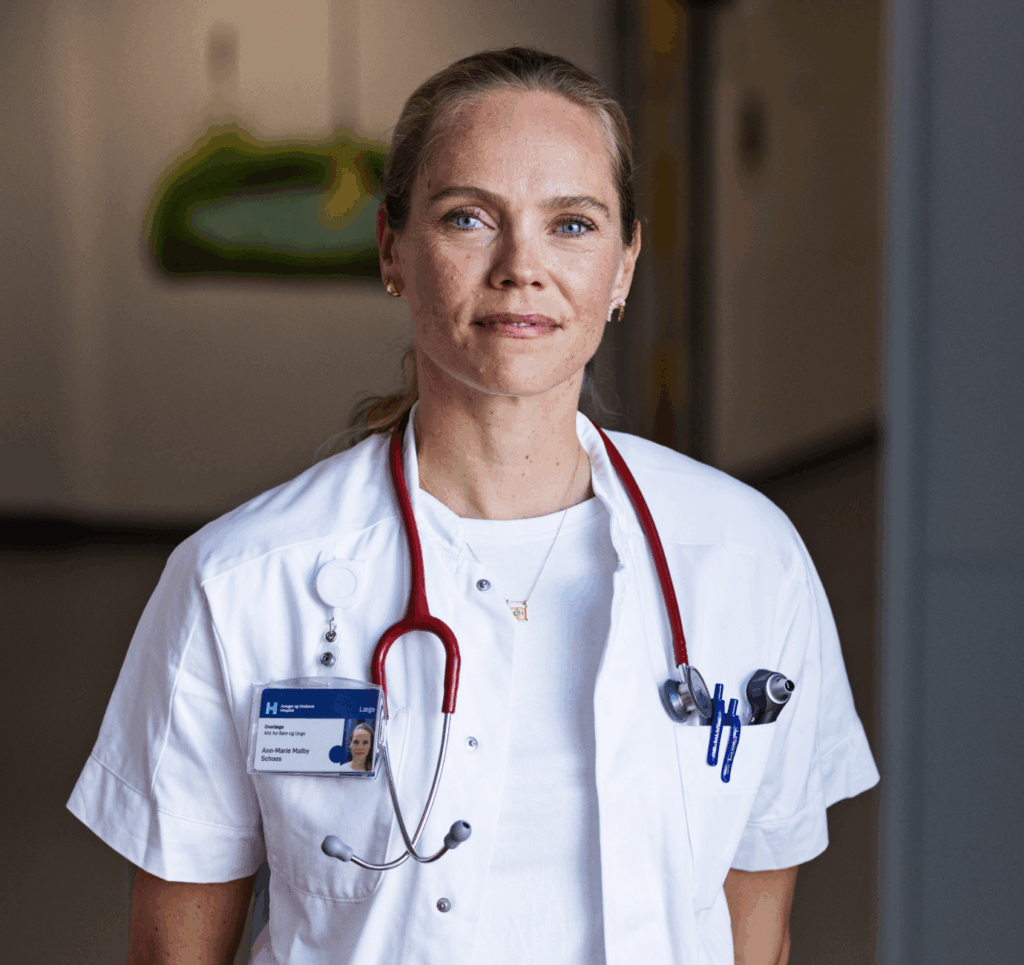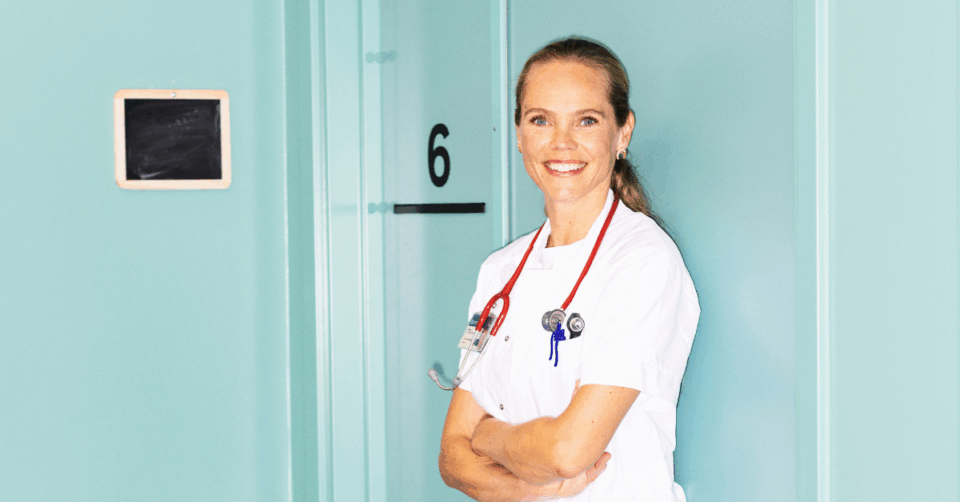18 November 2025
Pediatrician Ann-Marie Schoos will spend her time as LEO Foundation Dr Abildgaard Fellow studying atopic dermatitis. She is motivated by working towards early prevention of the disease.
What if you could stop atopic dermatitis (AD), before the eczema progresses at all? As a Senior Consultant in Pediatrics at Slagelse Hospital and Hvidovre Hospital, Ann-Marie Schoos sees children with this disease every week. Aside from the itchy skin that keeps them up at night, it is a disease that affects the whole household.
“It is no small task to provide the proper skincare routine for a child with AD. It requires applying creams several times a day. My ultimate goal is to prevent that anyone gets it,” she says.
The disease is generally treated with regular use of emollients and steroid creams or calcineurin inhibitors (that suppress the immune system) for flare-ups. For the most severe cases, biologic therapy has proved efficient. Because the condition breaks the skin’s barrier, patients have a risk of developing skin infections. Research also points to a higher risk of food allergies and other atopic diseases such as asthma and allergic rhinitis for people with AD.
“We know a lot about established AD, but what works in terms of prevention is not thoroughly studied. The support from the LEO Foundation gives us a chance to create a full picture,” Ann-Marie Schoos says.
Many perspectives at once
The LEO Foundation Dr Abildgaard Fellowship allows Ann-Marie Schoos to look at several factors that contribute to AD at once. Earlier studies have zoned in on single factors, but a multisided approach at this scale is new.
The research is conducted at the Copenhagen Prospective Studies of Asthma in Childhood (COPSAC) center, a part of Copenhagen University Hospital, Herlev-Gentofte. Here, large groups of children have been followed from birth through extensive assessments. They include environmental factors, genetics, and the microbiome – the community of microorganisms that live on and in the body. It is one of the largest studies of this kind in the world. Schoos initiated her research at the center in 2009, culminating in a PhD degree in 2015 and later a doctorate degree in 2024. With her team she will now combine longitudinal data on the blood, gut, exposure, and lifestyle of more than 1000 COPSAC patients.
“It is a unique material to work with. We have very high follow-up rates, so from most patients, we have data points from their whole childhood. Some of them I have followed since I started doing research 16 years ago,” Ann-Marie Schoos says.
By taking a range of factors into account, she wants to reduce the risk of pursuing too simple explanations.
“You can spend a long time as a researcher going down that road. Instead of assuming that one thing is the key to early preventive treatment of AD, we expect different versions of prevention for different patients. For some patients, a factor tied to the environment might be important to target together with a factor related to digestion and a genetic component. For others it could be another combination that is impactful,” she says.
Relying on the expertise of collaborators
During the project, she will test her scientific assumptions on so-called “mechanistic models” that mimic the skin and immune systems. This is made possible by her collaboration with Professor Susanne Brix from the Department of Biotechnology and Biomedicine at Technical University of Denmark and Professor Danuta Gutowska-Owsiak from the University of Gdańsk. Schoos will also work with her own bioanalysts from COPSAC to structure the data.
“This work requires a team,” she says and notes that she has never preferred to sit alone with her research.
“I talk about what I am working on, even if it is just in the staff kitchen when I am getting a cup of tea. Then a colleague will respond and offer input, and you have already moved away from getting stuck in a hole of quicksand. These relationships are important, because they add joy to the work no matter how a project is going.”
Voices of advice are available to her at the hospitals in both Slagelse and Hvidovre and from her colleagues at the COPSAC center. Its founder, Professor Hans Bisgaard, was her PhD advisor and an important mentor. He taught her a strong work ethic.
“His professional dedication was infectious. He treated team members as a second family and never lost sight of the patient. He would ask: What’s in it for the child? I keep coming back to that,” Ann-Marie Schoos says.
Ann-Marie Schoos, MD, PhD, DMSc
Research Associate Professor, University of Copenhagen
Copenhagen Prospective Studies of Asthma in Childhood (COPSAC), Dansk BørneAstma Center, Copenhagen University Hospital, Herlev-Gentofte
Senior Consultant in Pediatrics at Slagelse Hospital and Hvidovre Hospital
Project title: “Unraveling the Gut-Skin-Epigenome Axis: A Multi-Omics Approach to Early-Life Atopic Dermatitis”
What it covers: How gut health, immune responses, epigenetic and environmental factors contribute to the development of atopic dermatitis (AD) in early life. This research could pave the way for personalized, microbiome- and epigenetic-based therapies to stop AD before it starts.
Best advice for a young researcher: “Flexibility is key. Research rarely fits neatly into an 8-to-4 schedule – and that is part of its beauty. You are, in many ways, running your own small business: you set the goals, you drive the progress, and your effort determines the outcome. I have been able to raise a family alongside research by sometimes working early mornings or late evenings, but nobody does your basic legwork. That independence is both a challenge and a privilege – one that rewards creativity, persistence, and genuine passion for discovery.”
On receiving the LEO Foundation Dr Abildgaard Fellowship: “It provides valuable resources to expand my team at COPSAC and, importantly, to inspire and strengthen research environments in clinical settings such as Hvidovre Hospital – and especially at smaller hospitals such as Slagelse Hospital.”

